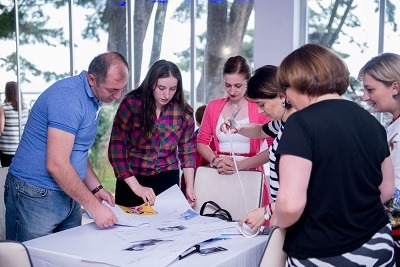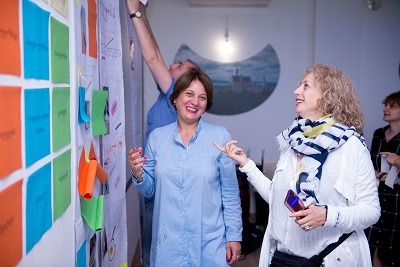Companies support women’s empowerment through mentoring
Date:
Inspired by their participation in UN Women’s mentoring programme trainings since late 2018, six companies in Georgia have started establishing their own workplace mentoring programmes for women’s empowerment.

They have identified over 60 workplace mentors from among their employees, all of whom have received training to be effective mentors to their mentees.
Mentoring has been found to be one of the most impactful activities for increasing diversity at work, compared to a variety of other diversity initiatives. Mentoring is, however, a new concept in Georgia, which is why UN Women decided to start by introducing it to a pilot group of interested companies last year.
Together with representatives from five other Georgian companies, the six companies convened in the village of Tsikhisdziri in western Georgia on 29 and 30 June 2019 to discuss their mentoring achievements and challenges. The meeting participants included the companies’ human resources managers as well as some 30 mentors and mentees of UN Women’s pilot programme.

Dio, a Georgian company producing aluminium doors, windows and blinds, is one of the companies that has started its own mentoring programme. The company successfully engaged both male and female mentors in their own pilot and matched them with female employees. “By the end of August, we will have finalized the first stage at our company. In September, we will have a presentation of the work done, invite new interested employees to join the programme and match them with mentees,” described Natia Qutidze, Head of the Human Resources Department at Dio.
Several company representatives said that mentoring has promoted a positive workplace culture where supervisees are less afraid of their managers and where colleagues are more willing to share their knowledge with one another. The mentees reported that mentoring had revealed new career development opportunities and nurtured a stronger feeling of being a part of advancing the common goals of their workplace. Several mentees have been promoted since they joined the initiative.
Madona Kezheradze described her experience as a mentee at School Euro-2000 in Batumi: “Shortly after I was hired in September 2018, the mentoring programme began at the company. This was a good time to join… At the beginning, I was an Information Manager, and now I am the Manager of Human Resources.”
UN Women’s mentoring work with companies is part of the Norway-funded project “A Joint Action for Women’s Economic Empowerment in Georgia”.